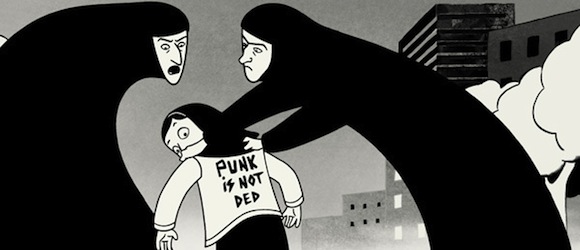Tunisia hasn’t exactly had the easiest time lately, what with the 2010-11 Tunisian revolution, their president fleeing the country, and the recent election of a veteran human rights activist to the new presidency. Now, controversy over a television airing of Marjane Satrapi‘s 2007 film based on her 2000 graphic novel and memoir Persepolis is rallying rights activists and political figures to again defend freedom of speech.
Satrapi’s memoir covers her delicately politically placed actual childhood: of elementary school age during the Iranian revolution, she was not quite old enough to understand what was going on when Iran’s first democratic steps away from the rule of a European installed monarchy ushered in a religiously conservative regime and spelled out a life for her and her secular family of fear and repression. The books/movie also cover her adolescence alone in the European boarding school her parents sent her to to because they feared the confident upbringing they gave her would lead her to prison or worse in her home country; and her early adulthood attempts to find a way to be herself under the Iranian regime.
Tunisia’s Nessma television station broadcast the movie late last year, seemingly unaware of one of its touchier aspects: it depicts Marjane’s imagined, honest childhood conversations with god, who is depicted as a large, bearded, robed man (she also has childhood conversations with Karl Marx, whose beard was curlier). The public airing of an image of god sparked violent protests, with arson attempts made on the television station and other attacks occuring at the home of Nessma’s president, Nabil Karoui.
Karoui initially apologized for airing the movie, perhaps implying that he had not known of the sequences beforehand:
“I am sorry for all the people who were disturbed by this sequence, which also shocked me,” said Karoui. “I believe that to have broadcast this sequence was a mistake. We never had the intention of attacking sacred values.”
Nevertheless, he is currently on trial for “insulting sacred values, offending decent morals and causing public unrest.” This weekend, when the proceedings briefly resumed, he also affirmed that Nessma would not be intimidated.
“I am sorry to be here today, this is a political trial,” Nessma’s head, Nabil Karoui, said on arrival. “It’s the trial of 10 million Tunisians who dreamed of having a democratic country.
According to Al Arabiya, Karoui’s defense team includes renowned lawyers, representatives of rights groups and non-governmental organizations and ex-political figures, including former prime minister Beji Caid Essebsi. Essebsi served as interim Prime Minister from the revolutionary-pressure-related-resignation of his predecessor to the election of human rights activist Moncef Marzouki last month. Karoui’s team see their work as “defending the freedom of expression in a trial that was a test of Tunisia’s youthful democracy.”
This isn’t the first time that the story of Marjane Satrapi’s life has incited controversy, or even violence, but lets hope it might be the last.
(Al Arabiya via Comic Book Resources.)








Published: Jan 23, 2012 02:19 pm